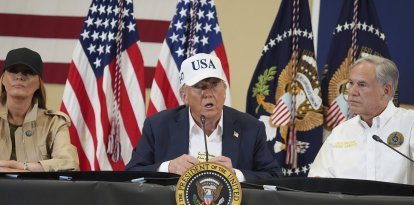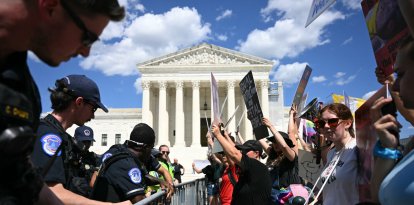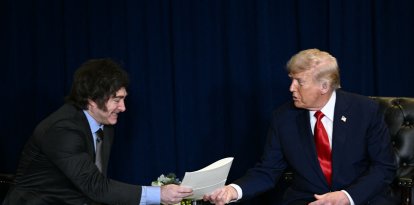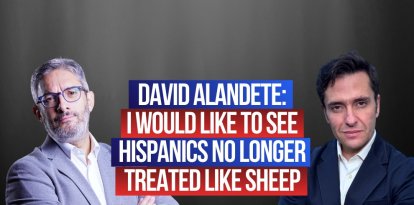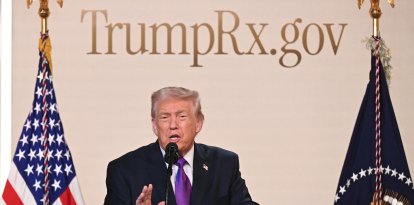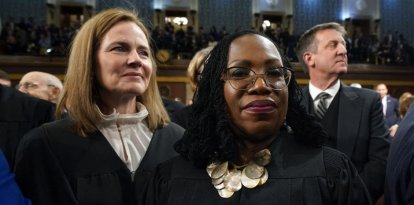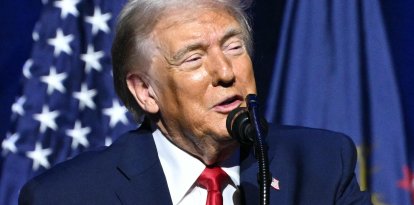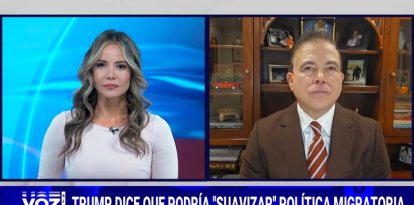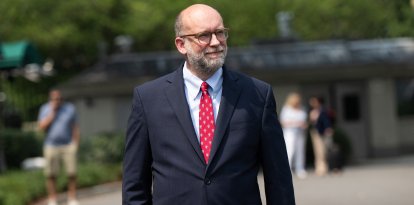David Pecker, the prosecution's first witness, exchanged praise with Trump after providing testimony that could harm the former president in New York
The former editor of The National Enquirer spoke about the Karen McDougal case and its relationship with that of Stormy Daniels.

(Cordon Press)
David Pecker, former editor of The National Enquirer, dominated the first week of Donald Trump’s trial in New York for falsifying business records. The prosecutor’s first witness showed some warmth towards the accused, whom he defined as “a mentor” and “friend,” and then described his participation in the suppression of the stories of Karen McDougal and Stormy Daniels, who claimed to have had relations with the then tycoon.
Pecker’s testimony was marked by the case of McDougal, a Playboy model whom he paid $150,000 through his company AMI to buy her story, with the intention of not publishing anything about it.
Regarding receiving the refund, he said he asked Michael Cohen, then Trump’s personal lawyer, about who would be responsible for reimbursing it. “The boss will take care of it,” he was told.
However, due to the delay with the payment, Pecker suggested that Cohen be the one to buy Daniels’ story before remembering that he “was not a bank,” which led to the confidentiality agreement that later led to this lawsuit.
As reported by The New York Times, Pecker and Cohen were in constant contact during the 2016 presidential campaign, strategizing how to prevent potentially damaging stories about Trump from coming to light.
Regarding McDougal, the witness confessed that the payment was disguised as a service contract to avoid violating campaign finance laws. “I wanted to protect my company, I wanted to protect myself and I wanted also to protect Donald Trump,” he said.
Pecker also mentioned a meeting in which Trump asked about McDougal as president-elect. It was at Trump Tower, in a meeting attended by James Comey, then director of the FBI, and Reince Priebus, then president of the Republican National Committee and later chief of staff.
Pecker then assured Trump that everything was fine, to which Trump joked that he knew “more than anyone in this room.” “They didn’t laugh,” the witness recalled.
Cross-examination by Trump’s lawyers, led by Emil Bove, focused on showing that such agreements were “standard operating procedure” and that magazines published only half of the stories they bought.
What is Trump accused of?
The case involves an alleged payment made by Trump’s former lawyer, Michael Cohen. The lawyer sent $130,000 to actress Stormy Daniels during the 2016 campaign, with the aim of silencing an alleged date between Trump and the actress in 2006. The alleged crime is whether that payment was disguised as a legal expense and the investigation is being carried out by the Manhattan district attorney, Alvin Bragg.
According to the Prosecutor’s version, Trump, or his trust, paid $420,000 to his former lawyer, including $130,000 for the payment and $50,000 for the digital work that Cohen did for Trump. That $180,000 was supposedly doubled to offset taxes, and the remaining $60,000 was a “bonus.”
Although confidentiality agreements are legal, the problem lies in how his company reimbursed Cohen. The payment was listed as a legal expense and the company claimed an alleged confidentiality agreement with Cohen. According to the prosecutor, no such agreement existed, and the expense was not related to any legal services by the attorney, potentially establishing a misdemeanor charge of falsifying business records.
According to Bragg, Trump personally signed several of the checks to Cohen while he was president. Additionally, according to POLITICO, “Trump has repeatedly denied wrongdoing regarding the payment and has denied Daniels’ claim that the couple had sex on one occasion in 2006.”
The Prosecutor’s Office can raise the misdemeanor to a felony, but it would have to prove that there was an “intent to defraud” on Trump’s part, setting the stage for a second offense. Precisely, this second crime would imply that the payment of $130,000 was an improper donation to Trump’s campaign because the money would have been used to stop a story with the purpose of benefiting his presidential campaign.













